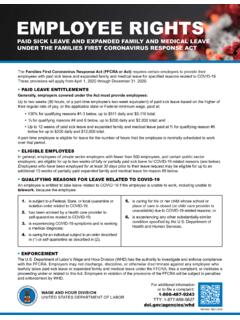Transcription of Your parental leave rights explained
1 your parental leave rights explained Guide to the parental leave Acts 1998 2006. Marking a decade of enhanced Irish Equality Legislation PROGRESS. This publication is supported under the European Community Programme for Employment and Social Solidarity PROGRESS. (2007 2013). This programme is managed by the Directorate-General for Employment, Social Affairs and Equal Opportunities of the European Commission. It was established to financially support the implementation of the objectives of the European Union in the employment and social affairs area, as set out in the Social Agenda, and thereby contribute to the achievement of the Lisbon Strategy goals in these fields.
2 The seven-year Programme targets all stakeholders who can help shape the development of appropriate and effective employment and social legislation and policies across the EU-27, EFTA-EEA and EU. candidate and pre-candidate countries. PROGRESS mission is to strengthen the EU contribution in support of Member States' commitments. PROGRESS will be instrumental in: providing analysis and policy advice on PROGRESS policy areas;. monitoring and reporting on the implementation of EU legislation and policies in PROGRESS policy areas.
3 Promoting policy transfer, learning and support among Member States on EU objectives and priorities; and relaying the views of the stakeholders and society at large. For more information see: The information contained in this publication does not necessarily reflect the position or opinion of the European Commission. parental leave Act, 1998 And parental leave Amendment Act, 2006. Explanatory Booklet This booklet sets out the main elements of the parental leave Act, 1998 ( of 1998) and the parental leave Amendment Act, 2006 ( of 2006), known collectively as the parental leave Acts.
4 It was further amended by provisions of the Civil Law (Miscellaneous Provisions) Acts 2008. Copies of the legislation are available from the Government Publications Office, Molesworth Street, Dublin 2 (Tel: 01 647 6879) or on They are also available on The parental leave Act, 1998 gives effect to an EU Directive on parental leave (96/34/EC) and came into operation on 3rd December, 1998. This booklet is intended for information purposes only. This is not a legal document. It is important to note that this is an information booklet on the provisions of the parental leave Acts.
5 It is not a legal interpretation of the provisions. You may need to seek legal advice for an interpretation of the provisions. 2 your parental leave rights explained Contents 1. Purpose of the Acts 4. 2. Entitlement to parental leave 4. Minimum Period of Employment Required 5. Transfer of leave 5. 3. How leave May Be Taken 6. Broken leave 6. 4. Protection of Employment rights 7. Annual leave and Public Holidays 7. Protection Against Dismissal 8. 5. Notification of parental leave 8. 6. Confirmation of parental leave 9.
6 Alterations to the Confirmation Document 9. Revocation of Notice 9. Illness 9. 7. Postponement of parental leave by the Employer 10. Notification of Postponement 10. Limitations on Postponement of leave 10. 8. Abuse of parental leave 11. Termination of parental leave 11. Refusal to Grant parental leave 12. 9. Return to Work 12. Alternative Employment 13. 10. Force Majeure leave 14. Notification of Force Majeure leave 14. Maximum Entitlement 15. Guide to the parental leave Acts 1998 2006 3. 11. Disputes 15. Reference of Disputes to rights Commissioner 15.
7 Appeal from Decision of rights Commissioner 15. Redress 15. Enforcement by the Circuit Court 16. Appeals to the High Court 16. 12. Records 17. 13. Preservation of Social Insurance Benefits 17. Records Update Section 17. Appendix A 18. Calculation of Broken leave 18. Example of Calculating Broken leave 20. Absences 21. Appendix B 22. Notice to Employer of Force Majeure leave 22. Application Form for Force Majeure leave 23. Appendix C 24. Frequently Asked Questions on parental leave 24. Frequently Asked Questions on Force Majeure leave 27.
8 Appendix D 29. The Equality Authority - Information and Support 29. Equality Information 29. Appendix E 31. Other Useful Contacts and Addresses 31. 4 your parental leave rights explained 1. Purpose of the Acts The parental leave Acts 1998 2006 have two main purposes: (a) to give men and women the right to take up to 14 weeks of unpaid leave from employment to allow them to take care of their young children. The Acts allow the parental leave to be taken either as a continuous block of 14 weeks or, with the agreement of the employer, broken up over a period of time.
9 The employment rights of the employee are protected while s/he is on parental leave , and the employee has the right to return to work after such an absence . (b) to provide for limited paid leave (force majeure leave ). to enable employees to deal with family emergencies resulting from the injury or illness of a family member up to a maximum of 3 days in any 12 consecutive months or 5. days in any 36 consecutive months. 2. Entitlement to parental leave Parents of children born on or after 3rd June, 1996, or adopted on or after that date, are entitled to parental leave .
10 Each parent is entitled to 14 weeks' parental leave for each child born or adopted on or after that date. The leave must be taken before the child reaches 8 years of age, except in certain circumstances in the case of an adopted Guide to the parental leave Acts 1998 2006 5. child. In the case of a child who is under 6 years at the time of the adoption, the leave must be taken before the child reaches 8. years of age. However, if the child is aged between 6 years and 8. years at the time of the adoption, the leave must be taken within 2.












